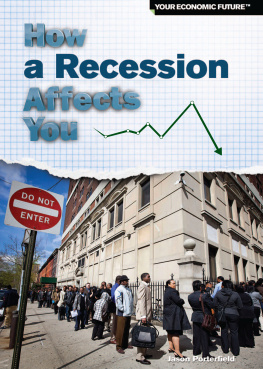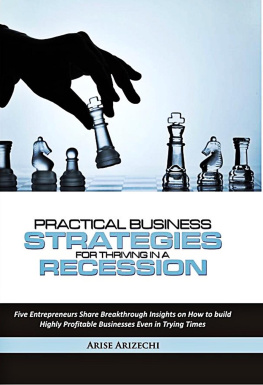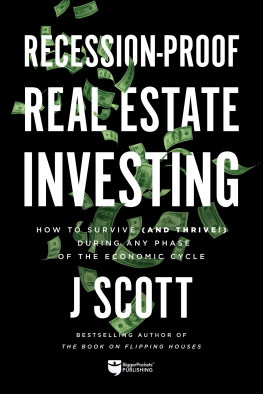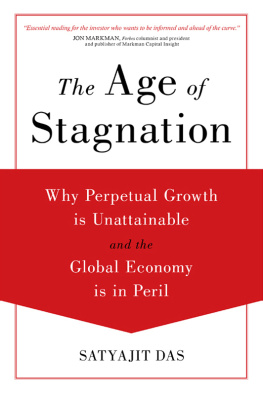ACCELERATING
OUT of the GREAT
RECESSION
How to Win in a Slow-Growth Economy
David Rhodes and Daniel Stelter
THE BOSTON CONSULTING GROUP


Copyright 2010 by The Boston Consulting Group, Inc. All rights reserved. Except as permitted under the United States Copyright Act of 1976, no part of this publication may be reproduced or distributed in any form or by any means, or stored in a database or retrieval system, without the prior written permission of the publisher.
ISBN: 978-0-07-174052-4
MHID: 0-07-174052-X
The material in this eBook also appears in the print version of this title: ISBN: 978-0-07-171814-1, MHID: 0-07-171814-1.
All trademarks are trademarks of their respective owners. Rather than put a trademark symbol after every occurrence of a trademarked name, we use names in an editorial fashion only, and to the benefit of the trademark owner, with no intention of infringement of the trademark. Where such designations appear in this book, they have been printed with initial caps.
McGraw-Hill eBooks are available at special quantity discounts to use as premiums and sales promotions, or for use in corporate training programs. To contact a representative please e-mail us at bulksales@mcgraw-hill.com.
TERMS OF USE
This is a copyrighted work and The McGraw-Hill Companies, Inc. (McGraw-Hill) and its licensors reserve all rights in and to the work. Use of this work is subject to these terms. Except as permitted under the Copyright Act of 1976 and the right to store and retrieve one copy of the work, you may not decompile, disassemble, reverse engineer, reproduce, modify, create derivative works based upon, transmit, distribute, disseminate, sell, publish or sublicense the work or any part of it without McGraw-Hills prior consent. You may use the work for your own noncommercial and personal use; any other use of the work is strictly prohibited. Your right to use the work may be terminated if you fail to comply with these terms.
THE WORK IS PROVIDED AS IS. McGRAW-HILL AND ITS LICENSORS MAKE NO GUARANTEES OR WARRANTIES AS TO THE ACCURACY, ADEQUACY OR COMPLETENESS OF OR RESULTS TO BE OBTAINED FROM USING THE WORK, INCLUDING ANY INFORMATION THAT CAN BE ACCESSED THROUGH THE WORK VIA HYPERLINK OR OTHERWISE, AND EXPRESSLY DISCLAIM ANY WARRANTY, EXPRESS OR IMPLIED, INCLUDING BUT NOT LIMITED TO IMPLIED WARRANTIES OF MERCHANTABILITY OR FITNESS FOR A PARTICULAR PURPOSE. McGraw-Hill and its licensors do not warrant or guarantee that the functions contained in the work will meet your requirements or that its operation will be uninterrupted or error free. Neither McGraw-Hill nor its licensors shall be liable to you or anyone else for any inaccuracy, error or omission, regardless of cause, in the work or for any damages resulting therefrom. McGraw-Hill has no responsibility for the content of any information accessed through the work. Under no circumstances shall McGraw-Hill and/or its licensors be liable for any indirect, incidental, special, punitive, consequential or similar damages that result from the use of or inability to use the work, even if any of them has been advised of the possibility of such damages. This limitation of liability shall apply to any claim or cause whatsoever whether such claim or cause arises in contract, tort or otherwise.
For our wives, Alex and Brunhild
CONTENTS
PART ONE
WHAT HAPPENED AND WHAT HAPPENS NEXT
CHAPTER 1
THE DAMAGED ECONOMY
CHAPTER 2
THE NEW REALITIES
PART TWO
WHAT TO DO
CHAPTER 3
EVEN IN THE WORST OF TIMES
CHAPTER 4
DEFENSE FIRST
CHAPTER 5
GO ON THE OFFENSIVE
CHAPTER 6
A NEW MANAGERIAL MIND-SET
APPENDIX A
ABOUT OUR METHODOLOGY AND SOURCES
APPENDIX B
ABOUT OUR SURVEYS
ACKNOWLEDGMENTS
In the year following the collapse of Lehman Brothers, we wrote a series of papers entitled Collateral Damage, laying out our view of the developing economic crisis, the emerging new realities, and the actions companies needed to take to prosper in a damaged economy. Some of the ideas in those papers, together with some of the research, helped to underpin this book.
A number of colleagues at The Boston Consulting Group (BCG) helped us to develop that thinking, and we wish to acknowledge their contribution to our work. In no particular order, they are Shubh Saumya, Andr Kronimus, Sylvain Duranton, Andrew Dyer, Philip Evans, Mike Deimler, Grant Freeland, Jean-Manuel Izaret, Andy Maguire, David Michael, Takashi Mitachi, Alexander Roos, Jeff Gell, Janmejaya Sinha, Bernd Waltermann, Chuck Scullion, Rainer Strack, Stpan Breedveld, Rune Jacobsen, Frank Plaschke, Gerry Hansell, Lars-Uwe Luther, Jeff Kotzen, Eric Olsen, Jens Kengelbach, Mathias Schatt, and Catherine Roche.
There is a small group of people who came with us on pretty much the whole journey. They dug out obscure data from long ago, they helped to research the archives, they were our eyes and ears on the developing economic story, and they helped to make the experience a most rewarding one for us. We want to thank Nimisha Jain, Jendrik Odewald, Katrin van Dyken, Jim Minifie, Renato Matiolli, William Gore-Randall, Carolin Eistert, Kyrill Radev, Daniel Schneider, and Hiroki Inada for their wholehearted efforts.
In addition, BCGs editor-in-chief, Simon Targett, provided wise counsel throughout the challenging process of writing this book, while John Butman contributed his experience in the art of writing business books. Mary Glenn, our publisher at McGraw-Hill, encouraged us to develop our work as a book, and Knox Huston, our editor at McGraw-Hill, was both constructive and responsiveand we thank them for this. We would also like to thank Todd Shuster, our literary agent, of Zachary Shuster Harmsworth, and Eric Gregoire of BCG, who helped our promotional efforts.
But there are two people who deserve special mention: Alex Dewar and Namrata Harishanker not only helped with all the research and the development of our ideas but also made enormous contributions to the writing of the book itself. We thank them for their hard work, for their unceasing good humor in the face of our unreasonable requests, andmost of allfor the quality of their contribution. Any shortcomings are ours alone.
INTRODUCTION
In the Aftermath of the Great Recession
It was not at all what the experts predicted. Most of them did not foresee that an economic powerhouse could suffer so much damage in such a short period of time. They did not expect the fast-growing gross domestic product (GDP) to go so spectacularly into reverse, the real estate bubble to burst as violently as it did, and industrial production and capacity utilization to fall so steeply. Nor did they expect the stock market to plunge so dramatically from its all-time highalthough it would recover some ground subsequently.
No, the Japanese (and Western) economists and analysts of 1991 predicted none of these developments. They expected that the 4 percent compound annual growth rate in real GDP that Japan had enjoyed for a decade would continue unabated. They expected that incomes, property values, industrial production, profits, and share prices would continue to rise.









